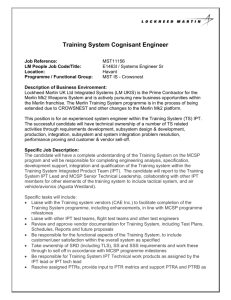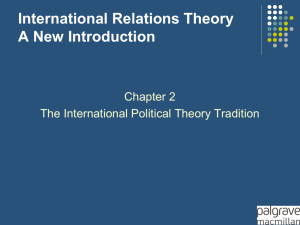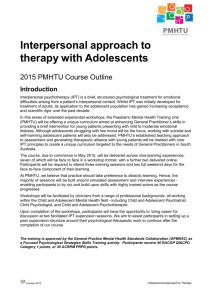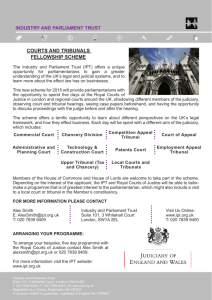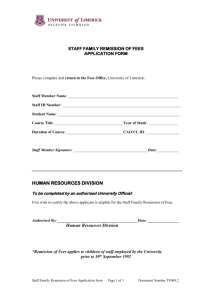Low dose chemotherapy with insulin (Insulin Potentiation Therapy
advertisement
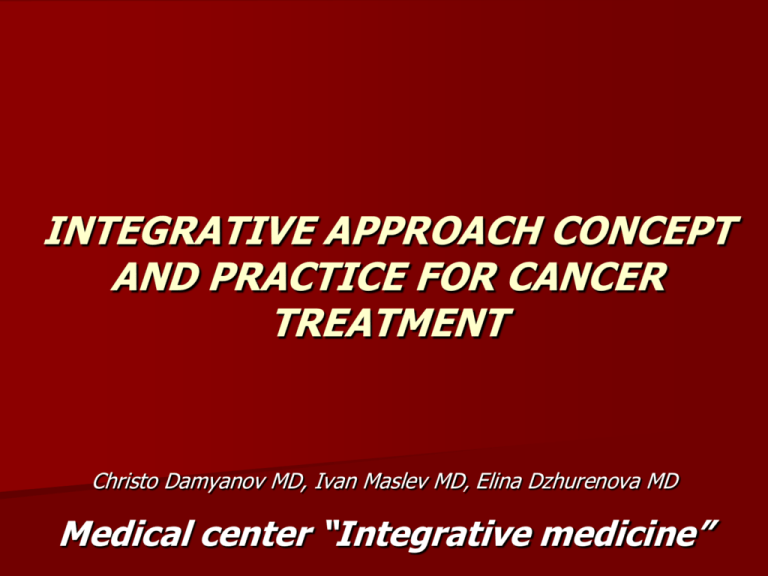
INTEGRATIVE APPROACH CONCEPT AND PRACTICE FOR CANCER TREATMENT Christo Damyanov MD, Ivan Maslev MD, Elina Dzhurenova MD Medical center “Integrative medicine” Sofia 2013 Medical center “Integrative medicine” Introduction Despite of the lack of interset and committment of the conventional medicine towards carrying out clinical researches on the possibilities of the Insulin Potentiation Therapy (IPT) in tumor disease treatment, the method is increasingly and more widely applied in the practice of more and more doctors and clinics. Although the IPT efficiency is disputed by the cancer specialists until clinical researches have been concluded, the doctors practicing the method have no doubt whatsoever of its low toxicity and the improved quality of life of the patients. Introduction The method application in the Medical Center “Integratve Mdicine” practice goes back to 2006 and more than 650 patients with advanced metastatic tumors have been treated by it, the major part of these following the failure of preceding chemotherapy and radiotherapy. In spite of the advanced illness and failure of the previous treatment, there was a significant improvement in the quality of life and remission in about 80 per cent of the patients. Our experience from the IPT application undoubtedly allows us to accept the IPT as a leading method in our practice. Introduction During the last year we used researches of the genetic profile of circulating tumor cells in the cases where the previous standard chemotherapy had failed. Our preliminary results indicate that in these cases the treatment efficiency increased and made it possible to avoid unnecessary medical procedures. Wider researches allow the use of more precise and suitable nutrients and immune modulators. Problems Restricting our Therapeutic Possibilities Lack of sufficient information and cooperation on the part of the patients The inability of some patients to change their life style and carry out the prescribed treatment within the allotted time frame Financial restrictions Limited possibility of using efficient alternative methods of treatment, such as: ultrasound and photodynamic therapy , hyperthermia, highly intensive focused ultrasound (HIFU), the Coley vaccine and others Possibilities to Combine the IPT with Efficient Complimentary and Alternative Methods 1. 2. 3. 4. The holistic approach and principles when treating cancer leads to a great extent to improved results. The overwhelming part of alternative and complimentary methods applied for cancer treatment need a longer period of impact which is insufficient in the cases with advanced metastases. The Insulin Potentiation Therapy is the fastest, efficient and non toxic method for achieving remission, making it possible at a later stage to also successfully include other alternative methods of anti-tumor efficiency in order to increase the final treatment results. The complimentary therapy within the interval is an important element of the treatment and selection of suitable methods and is substantively important to improving the treatment results. In the full remission cases the complimentary therapy could successfully be used to prevent relapses. Possibilities to Combine the IPT with Efficient Complimentary and Alternative Methods 5. The complimentary methods improve the results of the IPT application, however, the treatment as a whole following remission also needs the application of additional methods, such as: intravenous therapy with high Vit. C doses , ultrasound photodynamic therapy, hyperthermia, high-intensity focused ultrasound (HIFU) and others. 6. Well informed and cooperative patients, their full commitment to the treatment as well as regulating the psycho-emotional state of the patients are important elements of the entire treatment process. 7. Researches of the genetic profile of the circulating tumor cells offer new possibilities to increase the treatment efficiency. The Medical Center Integrative Medicine Concept for Integrative Approach in the Treatment of Cancer Treatment is based on the holistic approach with leading principles: Interaction and cooperation between doctor and patient; Application of suitable conventional and alternative methods helping the recuperating abilities of the body; Not ignoring the possibilities of both the conventional medicine and the alternative medicine and not accepting indiscriminately the alternative methods offered; Paying the necessary significance of factors as body, mind and spirit in the progress and outcome of the disease; The Medical Center Integrative Medicine Concept for Integrative Approach in the Treatment of Cancer Treatment is based on the holistic approach with leading principles: Optimum results from the treatment can be expected by capable application of the scientific achievements and openness towards new methods and possibilities; Application of natural non-invasive methods; Wide application of the integrative oncology to improve the health of all and prevention of cancer; Committing those practicing integrative oncology to the research problems in the field of CAM and the continuous development of knowledge and abilities. Individual Cancer Treatment Program 1. Methods for specific therapy: Insulin Potentiation Therapy (IPT), infusion therapy with high doses of Vit. C, photodynamic therapy, hyperthermia combined with IPT. 2. Basic therapy: a) reducing the impact of the risk factors for the disease origin: Elimination of focal infections and inflammation. Limiting the effect of toxic environmental factors. Diet therapy Detoxication b) Stimulating the immune system c) Regulating the dysfunction of different organs and systems. d) Regulating the psycho-emotional state of the patient. meditation, yoga, technique for emotional freedom anti stress therapy. Presentation of the Cases First Case I.T., a male patient of 75 y. was diagnosed and operated in March 2011 of low differential ductile adenocarcinoma of the pancreas. Result from Surgery: when inspecting the abdominal cavity a tumor formation was discovered covering the head and body of the pancreas and ductus holedohus. The case was considered as inoperable and directed for symptomatic treatment. A gall derivation was performed. Presentation of the Cases First Case The laboratory Test Results Before the Treatment Hb -131 g/l ( N 120-175);; WBC- 20 G/L (N 4-10); RBC4.63 T/L (N 3,9- 6,5); PLT- 630 G/L (N 140-400); ALAT45 U/I (N up to 40); ASAT- 40U/I(N up to 40), GGT- 186 U/I(N up to 39); APH- 404 U/I (N up to 270); LDH- 114 U/I (N up to 450); BIL - total 45.4 mkmol/ l (N up to 21); Cholesterol - total 4.64 mmol/ l (N 3,33- 5,70); Urea- 13.7 mmol/ l (N 2,8- 8,1); Creatinine- 181 mkmol/ l (N 44-110); Ferritin -272 mg/(N l20-200); CRP- 48,5 mg/ml( N up to 5); Fibrinogen -12.6 g/l (N 2- 4,5); СЕА-132,4 4 IU/ml ( N up to 3,4), СА-19-9132,4 IU/ml (N < 39 ). From the status –KPS-60. Symptomatic index according to BERETTA – 45 points. Presentation of the Cases First Case IPT therapy IPT therapy (30 March 2011) with 5-FU and Gemcitabine – one application a week. Within the interval – antiangiogenetic therapy, anti oxidants liver protectors, enzyme preparations, electro-therapy and ozone therapy. Following the third IPT application a significant improvement of his status was observed. The symptomatic index values reached 19 points. The total number of the IPT applications reached 19. The symptomatic BERETTA index – 0 points after the 19th therapy in January 2012. Control CT - disease stabilization. Presentation of the Cases First Case Follow up The patient is in a remission until July 2012 (13 months). Surgery (August 2012) - two large cysts on the pancreas were evacuated while the cytologic test indicated the presence of inflammatory and atypical cells. Following the operation: antioxidants, hepatoprotectors and enzyme preparations. The pains completely disappeared. In December 2012 control CT - persisting tumor formation on the pancreas head and local lymphadenomegalia was discovered. An intravenous therapy with Vit. C-20 combined with 600 mg ALA applied twice weekly were added to the treatment. Totally 9 applications were carried out. The complaints decreased significantly and the patient was stabilized. After February 2013 the patient was lost from observation. The total remission was over 18 months. Presentation of the Cases Second Case A 64 male with pains in the lumbar area with diagnosed (April 2008) metastatic tumor of the prostate with a histological result: adenocarcinoma-Gleason 7/2+5/. Hormone therapy was prescribed for one year with Goserelin (Zoladex), Buserelin (Superfact) and biophosphates (Zometa) as a result of which the patient is in remission until June 2009 when it was found that the ailment had progressed. In June 2009 a bilateral orchidectomy was performed, however, in spite of that fact the suffering progressed. The PSA and ALP values reached PSA-8395,0 and ALP-5264 respectively as of June 2009. The patient was offered a painkilling treatment. The symptomatic index (BERETTA) before the treatment was 31 points; KPS-70. Presentation of the Cases Second Case IPT therapy In July 2009 - IPT with Insulin (0,3/kg) and Docetaxel (8.6 mg/m2) and 20 per cent glucose i.v within 5 day intervals. By January 2010 18 IPT applications have been performed. Within the interval antiangiogenetic and antioxidant therapies were prescribed and LHRH agonist (Zoladex 3,6 mg) in monthly subcutaneous injections. Second Case Results The pain syndrome went away after the 4th application. The patient fully restored his quality of life and working capacity. The symptomatic index following the treatment – BERETTA was 1 point. At the control examination the biochemical indices after the 18th therapy were within the normal values. The control PSA test following the treatment indicated close to normal values – 3.33 ng/ml (Ref. 0.0-4,0 ng/ml). Treatment was discontinued for four months. Later on due to clinical and laboratory data for activation of the suffering the patient again was accepted for treatment. The PSA– 139.50 ng/ml. The IPT - new scheme: Epirubicin-(8.8 mg/m2), Vinkristin - ( 0. 44mg/m2), Endoxan – (240 mg/2)- 14 applications. The patient again improved his general status and working capacity, and PSA as of August 2011 reached 4.48 ng/ml. The BERETTA - 5 points. The examinations that followed established a remission with a fully restored working capacity until January 2013. Until August 2013, the patient’s complaints were insignificant and his working capacity was preserved. The total remission amounted to 62 months. Conclusion The results achieved from the treatment of more than 650 patients with highly advanced cancer, as of now, justifies our conclusions that the presented integrative approach with a leading IPTLD method represents a real possibility for solving one of the most serious problem in oncology connected with the toxicity of the standard chemotherapy. The case presented demonstrates serious possibilities for achieving a long term remission even when treating highly advanced tumors. Undoubtedly, the merit of this approach in our opinion together with the treatment results is the significantly improved quality of life of the patients treated in the prevailing number of cases. The holistic approach and suitable selection of the complimentary methods are the guarantee and perspective for improved results when treating the most serious cancer pathology. Thank you for your attention !

